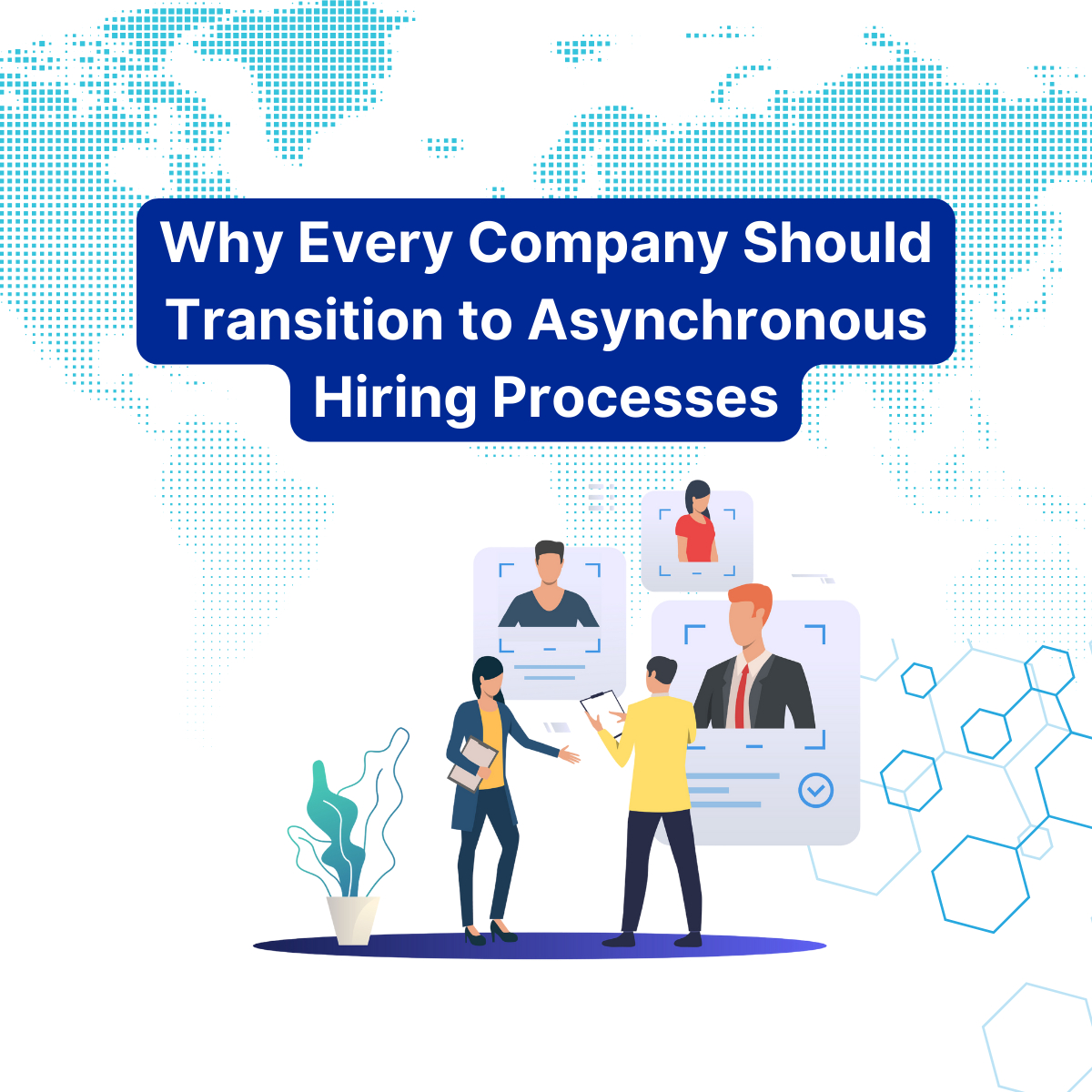
Why Every Company Should Transition to Asynchronous Hiring Processes
In today’s fast-paced and interconnected world, businesses are constantly seeking ways to optimize their operations. As remote work and digital transformation become the norm, traditional hiring methods often fall short in terms of flexibility, scalability, and inclusivity. Asynchronous hiring—where candidates and recruiters interact without needing to be present at the same time—offers a solution to these challenges, creating a more efficient and effective recruitment process. But why should every company embrace this shift? Let’s explore the key reasons, supported by research and case studies.

1. Enhanced Time Management and Efficiency
Asynchronous hiring enables candidates to complete interviews at their convenience, and recruiters can evaluate these submissions on their own schedule. This eliminates the logistical headaches of coordinating live interviews across time zones or during busy hiring seasons. According to a report by Harvard Business Review, asynchronous communication in workflows can reduce delays by up to 30%, directly affecting hiring timelines. For example, companies like Zapier and GitLab, which operate fully remotely, use asynchronous hiring to streamline their global recruitment processes. By doing so, they not only save time but also focus their efforts on meaningful evaluations rather than scheduling conflicts.
2. Access to a Global Talent Pool
By removing the constraints of synchronous interviews, companies can tap into a geographically diverse talent pool. Asynchronous hiring allows recruiters to engage with candidates regardless of their location, supporting the rise of distributed teams. Research from Gartner suggests that organizations embracing global hiring practices have a 25% higher chance of accessing specialized skill sets that are scarce in their local markets. A notable example is Automattic, the company behind WordPress, which credits its success to asynchronous hiring processes that allow them to attract top talent from over 70 countries.
3. Improved Candidate Experience
In a candidate-driven job market, providing a positive recruitment experience is essential. Asynchronous hiring empowers candidates to highlight their skills at a time and place where they feel most comfortable, reducing the stress associated with live interviews. A study by Glassdoor found that 58% of job seekers are more likely to accept an offer from a company that offers flexible hiring practices. By integrating asynchronous tools, such as recorded video interviews or online skill assessments, companies can demonstrate their commitment to candidate-centric processes, enhancing their employer brand.
4. Reduced Bias and Increased Fairness
Asynchronous hiring minimizes unconscious biases by allowing recruiters to assess candidates based on their responses rather than their physical presence or immediate impressions. Tools like AI-powered video analysis and structured evaluation criteria ensure consistent and objective assessments. According to a report by McKinsey & Company, companies that prioritize diversity and inclusion in their hiring practices are 36% more likely to outperform their peers financially. Asynchronous hiring facilitates unbiased recruitment, contributing to more workplaces that are inclusive.
5. Scalability and Speed
Traditional hiring methods struggle to keep pace during periods of rapid growth or high application volumes. Asynchronous processes, however, are inherently scalable. Recruiters can review multiple applications simultaneously, reducing bottlenecks in the pipeline. For instance, Google employs asynchronous elements in its hiring process, such as online coding challenges and pre-recorded interviews, to manage the thousands of applications it receives each week efficiently.
6. Better Data-Driven Decision Making
Asynchronous hiring generates structured data, including video recordings, test results, and written responses, that can be re-evaluated as needed. Advanced analytics tools can provide insights into candidates’ communication styles, problem-solving skills, and cultural fit, enhancing the decision-making process. A study by Deloitte highlights that organizations using data-driven hiring practices are 19% more likely to achieve superior performance outcomes. By leveraging technology, asynchronous hiring ensures every decision is backed by measurable metrics.
7. Cost Savings
Recruitment processes often involve significant costs, including travel expenses, venue rentals, and lost productivity due to prolonged interview schedules. Asynchronous hiring significantly reduces these overheads. A report by PwC found that organizations implementing asynchronous methods saved up to 40% on their recruitment budgets. For example, Shopify, a leading e-commerce platform, transitioned to asynchronous hiring to cut costs while maintaining the quality of its candidate evaluations, particularly for remote positions.

Conclusion
Asynchronous hiring is more than just a trend—it’s a paradigm shift in how companies identify and recruit top talent. By offering flexibility, reducing bias, and leveraging data-driven tools, this approach addresses the inefficiencies of traditional hiring processes and aligns with the demands of a globalized, digital workforce. Forward-thinking companies like GitLab, Zapier, and Automattic are already reaping the benefits, and others must follow suit to remain competitive. The question is not whether companies should transition to asynchronous hiring but when. With its potential to transform recruitment into a seamless, inclusive, and cost-effective process, asynchronous hiring represents the future of talent acquisition.
References:
- Harvard Business Review: "How Remote Work and Asynchronous Communication are Reshaping Collaboration"
- Gartner Research: "Global Talent Trends Report 2023"
- McKinsey & Company: "Diversity Wins: How Inclusion Matters"
- Deloitte Insights: "Data-Driven Hiring: The Future of Recruitment"
- PwC: "Future of Work and Cost Optimization in Recruitment"

 Technical Test
Technical Test
